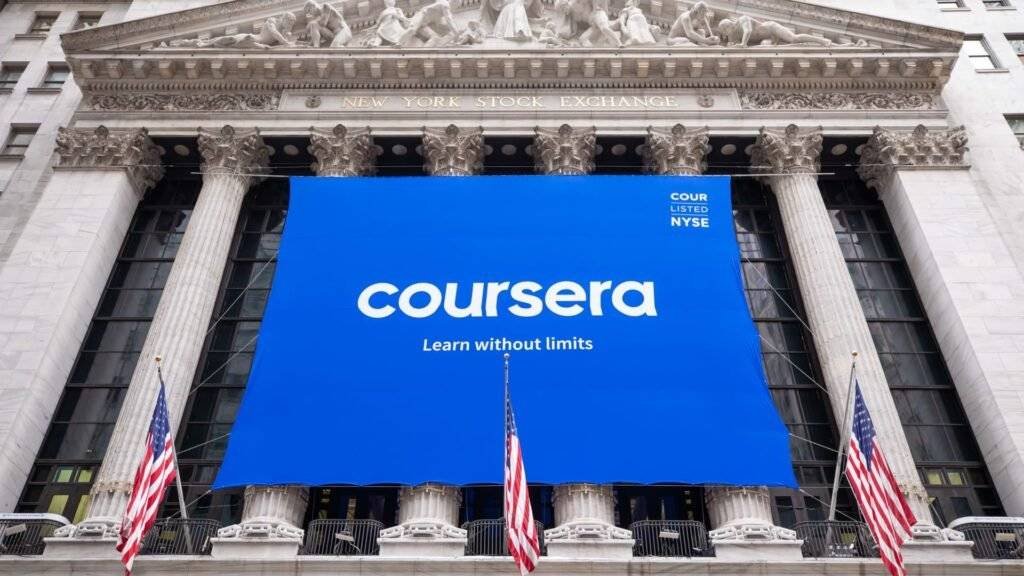What is Coursera?
Coursera is a pioneering online learning platform that revolutionized access to high-quality education globally. Founded in 2012 by computer science professors Andrew Ng and Daphne Koller from Stanford University, Coursera’s mission is to provide universal access to the world’s best education. Headquartered in Mountain View, California, Coursera partners with top universities and organizations to offer a wide range of online courses, specializations, and degree programs to learners worldwide.
Coursera’s platform enables learners to access cutting-edge courses taught by renowned instructors from prestigious institutions, all from the comfort of their homes or any location with an internet connection. By leveraging technology and online delivery, Coursera breaks down geographical barriers, making quality education accessible to anyone, regardless of their location or circumstances.
Course Offerings
Coursera offers a vast and diverse collection of courses spanning numerous subjects, levels, and formats. From introductory courses aimed at beginners to advanced specializations for professionals seeking to enhance their skills, Coursera caters to learners of all backgrounds and interests.
One of the core offerings on the platform is Massive Open Online Courses (MOOCs), which provide access to high-quality educational content from renowned universities and institutions worldwide. These courses cover a wide range of topics, including computer science, business, data science, humanities, social sciences, and more.
In addition to MOOCs, Coursera offers Specializations, which are a series of courses designed to build deep expertise in a specific subject area. These Specializations often include hands-on projects, allowing learners to apply their knowledge and gain practical experience.
For those seeking professional development or career advancement, Coursera offers Professional Certificates. These programs are designed in collaboration with industry leaders and provide job-relevant skills and credentials recognized by employers.
Furthermore, Coursera has introduced Master Track Certificates, which are part of a full Master’s degree program. These certificates allow learners to earn credit towards a Master’s degree from a top university while studying online at a flexible pace.
Coursera has also ventured into offering fully online degrees in partnership with prestigious universities. These degree programs provide a comprehensive and rigorous educational experience, allowing students to earn a respected qualification without the need for on-campus attendance.
Learning Experience
Coursera offers an immersive and engaging learning experience tailored to the needs of modern learners. At the heart of the platform are high-quality video lectures delivered by renowned instructors from prestigious universities and institutions. These lectures are carefully crafted, combining theoretical concepts with real-world examples and practical applications.
One of the key features that sets Coursera apart is the peer-reviewed assignments. Learners have the opportunity to submit their work and receive feedback from their peers, fostering a collaborative learning environment and enabling them to gain insights from diverse perspectives. This peer-review process not only enhances understanding but also develops critical thinking and evaluation skills.
Complementing the video lectures and assignments are vibrant discussion forums. These forums serve as virtual classrooms where learners can engage with their peers, ask questions, share ideas, and seek clarification from instructors or teaching assistants. The forums foster a sense of community and provide a valuable resource for learners to deepen their understanding and overcome challenges together.
Coursera recognizes the diverse schedules and commitments of its learners, offering flexibility in learning schedules. Courses are typically divided into weekly modules, allowing learners to progress at their own pace and fit their studies into their busy lives. This flexibility ensures that learners can balance their educational pursuits with work, family, or other responsibilities.
In addition to the core learning components, Coursera provides supplementary resources such as readings, quizzes, and coding exercises to reinforce learning and ensure mastery of the subject matter. The platform’s user-friendly interface and intuitive navigation make it easy for learners to access course materials, track their progress, and manage their learning journey.
Coursera for Business
Coursera recognizes the importance of continuous learning and skill development for businesses to stay competitive in today’s rapidly evolving job market. To cater to the needs of organizations, Coursera offers dedicated enterprise solutions through its “Coursera for Business” program. This program provides companies with access to a vast library of high-quality online courses, specialized programs, and professional certificates from top universities and industry leaders.
Through Coursera for Business, organizations can curate customized learning paths aligned with their specific training needs, enabling employees to acquire new skills, upskill, or reskill in areas crucial to their roles and the company’s growth. The platform offers a wide range of courses spanning various disciplines, including business, technology, data science, marketing, leadership, and more.
One of the key advantages of Coursera for Business is its flexibility. Employees can learn at their own pace, fitting their learning around their work schedules.
Furthermore, Coursera for Business facilitates collaboration and knowledge-sharing within organizations. Employees can participate in discussion forums, share insights, and learn from peers, fostering a culture of continuous learning and innovation.
By partnering with Coursera for Business, companies can unlock the potential of their workforce, drive innovation, and gain a competitive edge in their respective industries.
Coursera for Government
Coursera has established partnerships with various government agencies to provide workforce development and reskilling opportunities for public sector employees. Through these collaborations, Coursera offers tailored learning programs designed to equip government workers with the skills and knowledge necessary to adapt to evolving job demands and technological advancements.
One of Coursera’s key initiatives in this domain is the Coursera Government Workforce Program.
Furthermore, Coursera partners with government agencies to develop customized learning paths and curricula tailored to specific workforce needs. These curated programs cover a wide range of topics, from leadership and management skills to technical competencies required in various government sectors. By aligning learning resources with the unique requirements of government agencies, Coursera ensures that employees receive relevant and practical training.
In addition to its workforce development efforts, Coursera collaborates with government entities to promote digital literacy and skill development among citizens. Through initiatives such as community-based learning centers and online resource hubs, Coursera aims to bridge the digital divide and empower individuals with the knowledge and skills needed to thrive in the digital age.
Coursera’s partnerships with government agencies extend beyond traditional workforce development. The platform also supports government-led initiatives focused on economic development, entrepreneurship, and social impact. By providing access to high-quality educational resources, Coursera contributes to fostering innovation, driving economic growth, and promoting social mobility within communities.
Coursera for Campus
Coursera for Campus is a comprehensive offering designed to help universities integrate online learning into their on-campus degree programs. Through this initiative, Coursera partners with leading institutions worldwide to provide a seamless blended learning experience for students.
Coursera collaborates closely with universities to curate a vast library of online courses from top-ranked schools and industry experts. These courses span various disciplines, from computer science and data science to business, humanities, and beyond. By integrating Coursera’s high-quality content into their curricula, universities can enhance their course offerings, provide students with access to a diverse range of subjects, and expose them to cutting-edge knowledge from renowned instructors.
One of the key advantages of Coursera for Campus is the flexibility it offers. Universities can leverage Coursera’s online courses in multiple ways, such as supplementing traditional classroom instruction, offering fully online courses, or creating hybrid models that combine face-to-face and online components. This versatility allows institutions to tailor their educational approach to meet the unique needs of their students and academic programs.
Pricing and Subscription Models
Coursera offers a range of pricing options and subscription models to cater to different needs and budgets.
In addition to free courses, Coursera also offers paid courses and specializations. Paid courses typically range from $29 to $99, depending on the course duration and content. Learners have the flexibility to pay for individual courses or specializations based on their interests and learning goals.
For those seeking a more comprehensive learning experience, Coursera offers subscription plans.
Furthermore, Coursera offers a range of professional certificates and online degrees in partnership with top universities and companies. Professional certificates are designed to help learners acquire job-relevant skills and can cost between $39 and $99 per month. Online degrees, such as bachelor’s and master’s programs, have varying tuition fees based on the program and institution.
Coursera’s pricing and subscription models cater to different learning needs and budgets, making high-quality education accessible to a global audience.
Coursera Credentials and Certificates
Coursera offers various types of credentials and certificates to validate the knowledge and skills acquired by learners. These credentials hold significant value in the job market and are recognized by employers worldwide.
Coursera Courses: Upon successful completion of a course, learners receive a course certificate. These certificates demonstrate proficiency in a specific subject area and can be valuable additions to resumes and portfolios.
Specializations: Specializations are a series of courses designed to build expertise in a particular domain. Upon completing all the required courses, learners earn a Specialization Certificate, which showcases their mastery of the subject matter.
Professional Certificates: Professional Certificates are designed in collaboration with industry leaders and top universities. These certificates are tailored to equip learners with job-ready skills and knowledge. Employers widely recognize Professional Certificates as they demonstrate practical, industry-relevant expertise.
MasterTrack Certificates: MasterTrack Certificates are a structured way to earn a Master’s degree credential from top universities.
Degrees: Coursera partners with renowned universities to offer fully online degree programs. Learners can earn accredited Bachelor’s and Master’s degrees from prestigious institutions, providing them with the same qualifications as on-campus students.
The value of Coursera credentials lies in their industry relevance, rigorous curriculum, and recognition by employers worldwide.
User Community and Engagement
Instructors actively participate in these forums, providing guidance, answering queries, and fostering an inclusive and supportive learning environment.
In addition to the online forums, Coursera encourages learners to organize local meetups and study groups. These interactive sessions allow learners to ask questions, receive personalized feedback, and gain deeper insights into the course material.
Coursera’s Impact and Reach
Coursera has emerged as a global leader in online education, revolutionizing the way people learn and access quality educational resources.
Coursera’s impact extends far beyond mere enrollment numbers.
Future Developments and Innovations
Coursera is continuously exploring new technologies and partnerships to enhance the online learning experience and expand access to education. One area of focus is leveraging virtual reality (VR) and augmented reality (AR) to create immersive, interactive learning environments.
Coursera’s Contributions to Democratizing Education
Coursera’s mission is to transform lives through accessible world-class learning.
Comparison with Other Online Learning Platforms
Coursera stands out among other online learning platforms due to its extensive partnerships with top universities and organizations worldwide. This collaboration allows Coursera to offer a vast array of high-quality courses across various disciplines, from prestigious institutions.
Another unique aspect of Coursera is its focus on offering comprehensive programs and specializations, rather than just individual courses. This approach caters to learners seeking comprehensive skill development or career advancement opportunities.
Overall, Coursera’s strengths lie in its academic partnerships, structured learning paths, and emphasis on credentialed programs.


